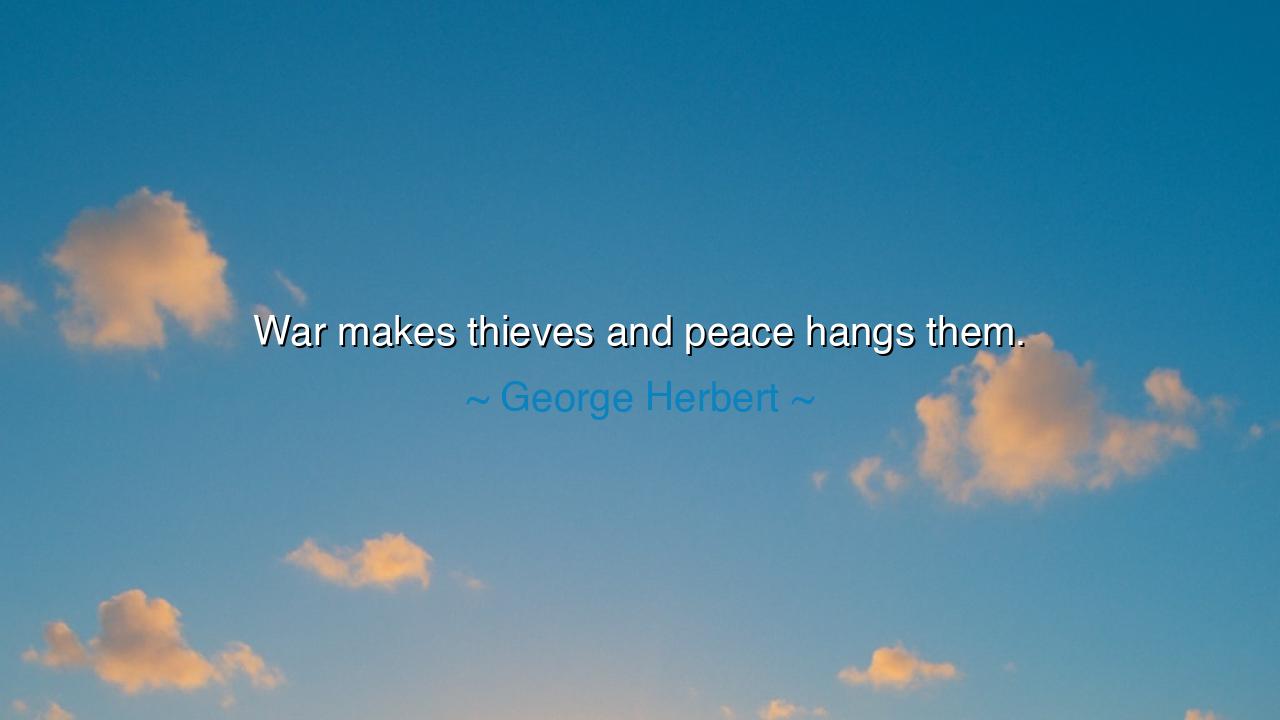
War makes thieves and peace hangs them.






Hear the words of George Herbert, poet and priest, who gazed upon the turmoil of his age and spoke with the clarity of timeless truth: “War makes thieves and peace hangs them.” This saying is sharp as a double-edged blade, for it reveals the cruel irony of the world: in times of strife, law is bent, order is broken, and men commit deeds under the cloak of chaos which in calmer days would lead them to the gallows. Yet when peace returns, society remembers its laws, its order, its stern hand—and those who once thrived in war’s darkness find themselves condemned by the very stability they helped to shatter.
In these words lies a teaching both bitter and wise. War does not merely kill the body; it also corrupts the soul. It creates conditions where looting, treachery, and plunder are rewarded, or at least excused. A soldier who takes in war may be hailed as bold; a commander who pillages may be seen as triumphant. But when the trumpet of war is silenced, when the land hungers for peace, the same acts are called crimes, and the same men are judged as villains. Thus does Herbert remind us that war twists morality, and peace seeks to straighten it again.
Consider the tale of the English Civil War in Herbert’s own century. Soldiers roamed the countryside, seizing from the poor in the name of necessity, plundering homes, burning fields, and calling it survival. When the wars ended and the crown was restored, many who had once been tolerated as hardened warriors or resourceful survivors were suddenly branded criminals, subject to trial and execution. War had made them thieves, but peace now sought to cleanse the land by hanging them. Here history itself proves Herbert’s grim observation.
The lesson, however, is not merely about hypocrisy, but about the deeper truth of human frailty. War tempts us to justify evil, to cloak greed in necessity, and to call cruelty by the name of valor. But when the tempest stills, the mask is torn away, and the same acts are revealed for what they always were—sins against justice and mercy. What war permits, peace condemns. This is why wise men from every age have warned that the greatest victory is not found in conquest, but in restraining the hand from violence.
But let us also hear another echo in Herbert’s words: that peace is both a blessing and a judgment. It restores the laws that protect the weak, the order that secures the land, and the justice that punishes the guilty. It is not only a time of healing, but also a time of reckoning. For when the storm passes, men are forced to account for what they did when the thunder raged. Thus, the coming of peace is not only relief, but also exposure. It is the light that shows what shadows hid.
And so, children of tomorrow, learn from this proverb. Do not excuse your wrongs by saying, “the times were hard.” Do not cloak your greed in the language of necessity. What you plant in war will be harvested in peace. Better to be righteous in the midst of turmoil than to be condemned when calm returns. Remember: the world may change its face, but truth remains the same. Justice delayed is not justice denied.
Therefore, live wisely. When chaos comes, choose integrity over gain. When conflict tempts you to abandon your honor, remember that peace will one day return and will ask what you have done. Guard your soul from corruption, even in dark times. In this way, Herbert’s warning becomes your strength: though war may make thieves, you need not be among them, and when peace returns, you will stand unashamed beneath its light.






AAdministratorAdministrator
Welcome, honored guests. Please leave a comment, we will respond soon